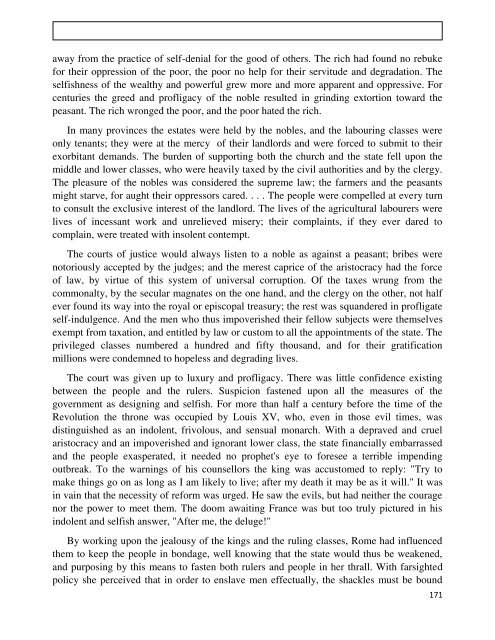Finishing the Race
Of all the games instituted among the Greeks and the Romans, the races were the most ancient and the most highly esteemed … The contests were governed by strict regulations, from which there was no appeal. Those who desired their names entered as competitors for the prize had first to undergo a severe preparatory training. Harmful indulgence of appetite, or any other gratification that would lower mental or physical vigour, was strictly forbidden. For one to have any hope of success in these trials of strength and speed, the muscles must be strong and supple, and the nerves well under control. Every movement must be certain, every step swift and unswerving; the physical powers must reach the highest mark.
Of all the games instituted among the Greeks and the Romans, the races were the most ancient and the most highly esteemed … The contests were governed by strict regulations, from which there was no appeal. Those who desired their names entered as competitors for the prize had first to undergo a severe preparatory training. Harmful indulgence of appetite, or any other gratification that would lower mental or physical vigour, was strictly forbidden. For one to have any hope of success in these trials of strength and speed, the muscles must be strong and supple, and the nerves well under control. Every movement must be certain, every step swift and unswerving; the physical powers must reach the highest mark.
Create successful ePaper yourself
Turn your PDF publications into a flip-book with our unique Google optimized e-Paper software.
away from <strong>the</strong> practice of self-denial for <strong>the</strong> good of o<strong>the</strong>rs. The rich had found no rebuke<br />
for <strong>the</strong>ir oppression of <strong>the</strong> poor, <strong>the</strong> poor no help for <strong>the</strong>ir servitude and degradation. The<br />
selfishness of <strong>the</strong> wealthy and powerful grew more and more apparent and oppressive. For<br />
centuries <strong>the</strong> greed and profligacy of <strong>the</strong> noble resulted in grinding extortion toward <strong>the</strong><br />
peasant. The rich wronged <strong>the</strong> poor, and <strong>the</strong> poor hated <strong>the</strong> rich.<br />
In many provinces <strong>the</strong> estates were held by <strong>the</strong> nobles, and <strong>the</strong> labouring classes were<br />
only tenants; <strong>the</strong>y were at <strong>the</strong> mercy of <strong>the</strong>ir landlords and were forced to submit to <strong>the</strong>ir<br />
exorbitant demands. The burden of supporting both <strong>the</strong> church and <strong>the</strong> state fell upon <strong>the</strong><br />
middle and lower classes, who were heavily taxed by <strong>the</strong> civil authorities and by <strong>the</strong> clergy.<br />
The pleasure of <strong>the</strong> nobles was considered <strong>the</strong> supreme law; <strong>the</strong> farmers and <strong>the</strong> peasants<br />
might starve, for aught <strong>the</strong>ir oppressors cared. . . . The people were compelled at every turn<br />
to consult <strong>the</strong> exclusive interest of <strong>the</strong> landlord. The lives of <strong>the</strong> agricultural labourers were<br />
lives of incessant work and unrelieved misery; <strong>the</strong>ir complaints, if <strong>the</strong>y ever dared to<br />
complain, were treated with insolent contempt.<br />
The courts of justice would always listen to a noble as against a peasant; bribes were<br />
notoriously accepted by <strong>the</strong> judges; and <strong>the</strong> merest caprice of <strong>the</strong> aristocracy had <strong>the</strong> force<br />
of law, by virtue of this system of universal corruption. Of <strong>the</strong> taxes wrung from <strong>the</strong><br />
commonalty, by <strong>the</strong> secular magnates on <strong>the</strong> one hand, and <strong>the</strong> clergy on <strong>the</strong> o<strong>the</strong>r, not half<br />
ever found its way into <strong>the</strong> royal or episcopal treasury; <strong>the</strong> rest was squandered in profligate<br />
self-indulgence. And <strong>the</strong> men who thus impoverished <strong>the</strong>ir fellow subjects were <strong>the</strong>mselves<br />
exempt from taxation, and entitled by law or custom to all <strong>the</strong> appointments of <strong>the</strong> state. The<br />
privileged classes numbered a hundred and fifty thousand, and for <strong>the</strong>ir gratification<br />
millions were condemned to hopeless and degrading lives.<br />
The court was given up to luxury and profligacy. There was little confidence existing<br />
between <strong>the</strong> people and <strong>the</strong> rulers. Suspicion fastened upon all <strong>the</strong> measures of <strong>the</strong><br />
government as designing and selfish. For more than half a century before <strong>the</strong> time of <strong>the</strong><br />
Revolution <strong>the</strong> throne was occupied by Louis XV, who, even in those evil times, was<br />
distinguished as an indolent, frivolous, and sensual monarch. With a depraved and cruel<br />
aristocracy and an impoverished and ignorant lower class, <strong>the</strong> state financially embarrassed<br />
and <strong>the</strong> people exasperated, it needed no prophet's eye to foresee a terrible impending<br />
outbreak. To <strong>the</strong> warnings of his counsellors <strong>the</strong> king was accustomed to reply: "Try to<br />
make things go on as long as I am likely to live; after my death it may be as it will." It was<br />
in vain that <strong>the</strong> necessity of reform was urged. He saw <strong>the</strong> evils, but had nei<strong>the</strong>r <strong>the</strong> courage<br />
nor <strong>the</strong> power to meet <strong>the</strong>m. The doom awaiting France was but too truly pictured in his<br />
indolent and selfish answer, "After me, <strong>the</strong> deluge!"<br />
By working upon <strong>the</strong> jealousy of <strong>the</strong> kings and <strong>the</strong> ruling classes, Rome had influenced<br />
<strong>the</strong>m to keep <strong>the</strong> people in bondage, well knowing that <strong>the</strong> state would thus be weakened,<br />
and purposing by this means to fasten both rulers and people in her thrall. With farsighted<br />
policy she perceived that in order to enslave men effectually, <strong>the</strong> shackles must be bound<br />
171
















